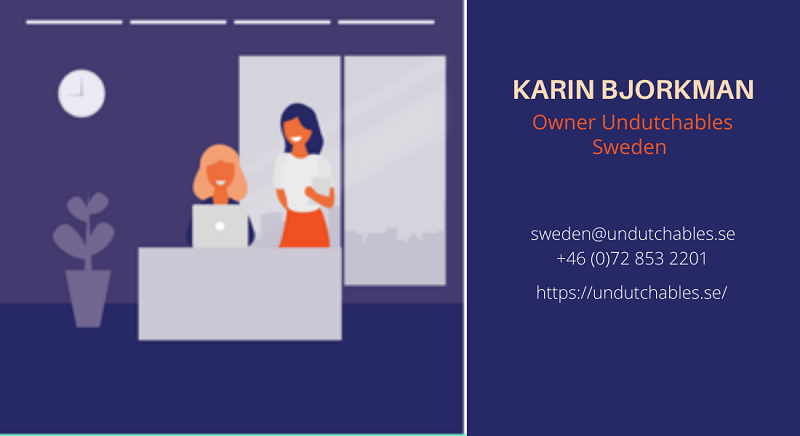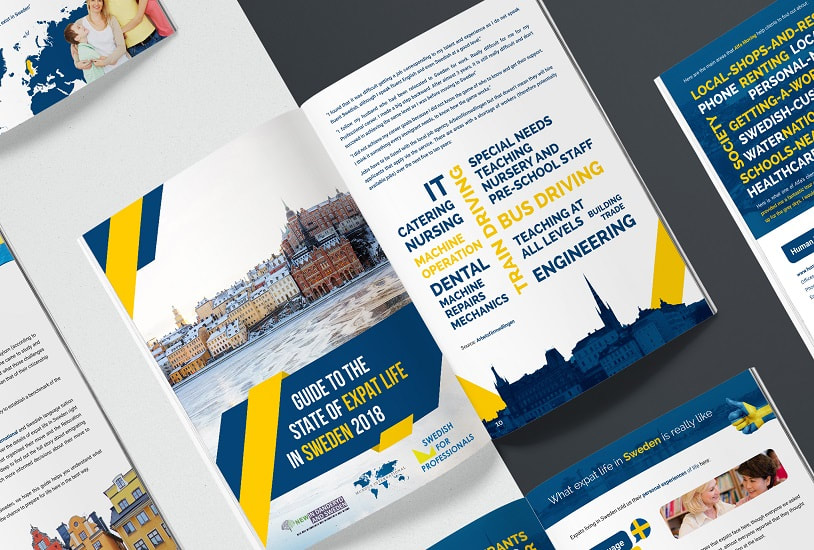|
This year has been a tough year for a lot of people. Many jobs in Sweden have been directly or indirectly affected by the coronavirus crisis. A lot of people lost their jobs and finding new job became harder. If you are planning to work here, you don't want to waste time job-hunting in the wrong way. Many jobs here are filled through network or referrals. People want to know who you are before they interview you. One of the major reasons that networking is such an effective way to get a job is that there is something of a hidden job market out there. Some estimate that as much as 80% percent of new jobs are never listed but are instead filled internally or via networking. Here are our tips for reaching your job-hunting goal Expanding your network: Ask amongst your own network - you might know professional mentors and recruitment agents, they mostly have wide connections with companies. Seek and join professional groups online (Facebook and LinkedIn or an unemployment programme) to expand your job search and network. During this downtime, it’s the perfect opportunity to make new connections and revive old ones. Mentorship Programmes: A mentor programme is an answer to several different aspects of job-hunting, from personal support to tapping into the programme’s own network, which are often large. Apprenticeships: They are a great way of handling the handover between generations and of working in an efficient and cost-conscious way while developing competence in the role. Get a Mentor or Coach: Mentors and coaches are usually individuals who have some experience in their fields and can give advice to help you advance in your career. Mentors and coaches can offer unique perspectives and have often been through similar experiences that they can share to help push you closer towards your goals. Mentors or coaches can be within your networks; a former manager, teacher, or a co-worker can all be people to consider to help mentor you. Recruitment Agencies: Such as Undutchables Recruitment Agency the international business recruitment pioneer helps both starters and executive candidates, fluent in languages, advance their careers in Sweden and the Netherlands. If you want to further your career in Sweden, Undutchables can help you find the perfect match. Below you can find the link to the Recruitment Agency: https://undutchables.se/ Learning new skills is one of the best ways to become more successful in your career. Whether you are looking for a new career opportunity or would like to move into a more senior role, upgrading your skills can increase your chances of reaching your career goals. Professional development training: This kind of training can range from short (a few hours or a couple of days) to longer training that may be ongoing. Professional development training can be specific to your industry or may focus on the development of soft skills, such as communication, leadership, or working with others. The benefits of upgrading your skills include: Increased self-confidence, Improved marketability and competitiveness, Greater resourcefulness, Better career opportunities A great place to start is to look at current job postings to assess the specific job tasks and qualifications that are required of the kind of jobs you want. Also, expand your search to include roles you may not yet be qualified for but you could pursue with additional training. This involves exploring the possibilities and keeping an open mind. Look for the most available opportunities. Most importantly, keep yourself positive and motivated. Good luck!
3 Comments
Finding a job in Sweden can be harder than you might expect. Understanding how to find a professional job will save you hours and hours of wasted energy. Our workshops in February 2020 cover everything you need to know about finding a professional job here and the detail of exactly how to apply. They are held in Danderyd (north side of Stockholm). 5th February 2020 - Finding a professional job in Sweden This two-hour workshop is designed to give practical tips and information about how to find a professional job in Sweden. The programme includes:
If you are planning to work here and don't want to waste time job-hunting in the wrong way, don't miss this workshop! 12th February 2020 - Applying for a professional job in Sweden Learn all about C.V.s, LinkedIn and application letters from a Swedish perspective. The goal is to give useful tips when applying for jobs and the programme includes:
Your workshop trainer:
Book one or both workshops here:Career workshop - find a professional job in Sweden
SEK 490.00
This two-hour workshop is designed to give practical tips and information about how to find a professional job in Sweden. The programme includes: • Myths about jobs in Sweden. • Making a self-inventory • Defining the job market - type of company and role. Geographical and branch perspective. • Your network. • Setting your career goal • The job-hunting process in Sweden – ring – follow up. Fit EVERY C.V. to the company’s specific needs. • The meeting – recruitment companies, C.V. network, spontaneous applications • Salaries, benefits, idiosynchrasies • First day in the office Questions and Answers
If you are planning to work here and don't want to waste time job-hunting in the wrong way, don't miss this workshop! Career workshop - applying for a professional job in Sweden
SEK 490.00
Learn all about C.V.s, LinkedIn and application letters from a Swedish perspective. The goal is to give useful tips when applying for jobs and the programme includes:
However, Sweden has almost the lowest number of unskilled jobs in the EU, with only Switzerland and Norway having less. What does all this mean? It isn’t easy for Swedes or expats to get jobs, the job market isn’t as open as in other countries, the population (and therefore available jobs) is much smaller and the whole system works in a different way. Understanding how the job market and recruitment processes work will make a huge difference in the success of any job hunt and here are some tips from us: - Visit employment fairs Big Swedish companies, such as IKEA, Volvo and Skanska regularly tour employment fairs to meet potential new employees. Employment fairs are great places to network with potential employers in your field, to take part in interviews and go to useful seminars. Make sure you go to the fairs prepared with a stack of CVs and cover letters. Decide which companies you want to talk to and what they might be impressed by before you go. After the fair, send follow-up emails to the people you spoke to – this is often the crucial step. - Make sure that your employer is the real deal This might not seem like a big deal. As long as someone says you've a job waiting, you're in the clear... right? Well, the situation is unfortunately a bit more complicated. Before jumping to the next step of actually obtaining a work permit, you should make sure that your employer is registered as such. If this is not the case, your supposed employer doesn't even have ability to pay you a formal salary. This could jeopardise your ability to receive a permit and also cause you to put a lot of energy into something that will turn out to be fruitless. - Learn Swedish While it’s true that nearly everyone in Sweden speaks English and many large companies – even Swedish ones – have English as their corporate language, being proficient at Swedish will open up lots of doors when it comes to finding work and building work relationships. Even if you apply for a job that specifically demands fluent English or where a native English speaker is preferred, your ability to speak even conversational Swedish will make you better qualified. - Apply for a work permit If you will need a permit to work in Sweden, collect together all the relevant information before you start the process, such as your correspondence with your employer, a copy of the job advertisement and your passport. Take everything to the immigration office, Migrationsverket. - Take an internship Internships can be a great way to gain relevant experience and build your professional network. Even if they don’t lead directly to a job offer, you’ll have a reference from a Swedish company and a notable update for your CV. Look out for advertisements – there are often plenty around - or contact a company you’d like to do an internship at directly. - Register yourself at Skatteverket Once you have a valid work permit, you will also receive a residence permit card. This enables you to obtain a personal identity number. This number is your key to being a part of the formal society. It enables you to open a bank account, pay taxes and deal with all administrative issues. Read more about personal numbers in our post here. Register yourself at the tax office (which also handles anything to do with the population of Sweden, including personal numbers) – Skatteverket – as soon as possible. Pretty much everything in Sweden revolves around a personal identity number and not having one will act as a barrier between you and an easy life! - Contact employers directly and network to build connections When you look at Swedish job ads you may notice they include contact details for an employee who can answer questions about the post. That person is often involved in deciding who gets the position, so it can be worth your while to call them up, ask a few relevant questions and engage them in conversion. Hopefully you’ll impress them enough to remember your name when your application lands on their desk. If that isn’t possible, try to go to events in your field to make connections that can help you get in touch with the people that are hiring. Job hunting in Sweden isn’t always easy so to help in making the process a bit simpler, use these tips. They might not all work for you but they should give you a head-start at least.
Though language learning is mentioned, many expats told us that they perceived they were excluded from job opportunities not for lack of language ability because they were foreign – on the surface, clear discrimination – but when we dug down deep, we could see another cause, one you can read about in our guide to the State of Expat Life in Sweden 2018! “Sometimes all the planning in the world won't prepare you for it, but as long as you know where your nearest coffee house is everything falls into place!”
We at New in Sweden (NiDS) worked with news and analysis provider Mundus International and Swedish language tuition provider Swedish for Professionals to uncover the details of expat life in Sweden. We have quizzed expats that are here, the HR staff that organised their move and the Relocation Agents that supported them during the process. We dug deep to find out the full story about emigrating here and hope that new arrivals can then make much more informed decisions about their move to Sweden. Our guide to the state of expat life in Sweden is out now. It covers the main challenges expats are experiencing right now and the reasons for them, the support that is and isn’t provided at a personal level and what help is out there. We have a separate report that looks at what expats told us in comparison with other surveys, the political environment and what needs to change for expat life to improve. Get your copies of both here. Recent developments have caused much attention in regards to the Swedish model and the possibility of living and working in Sweden. If you're a citizen of EU, you're in luck. You can essentially travel to Sweden and start looking for a job. However, those of you who are on the outside of the EU have to keep a few things in mind: 1. Make sure that your employer is the real deal This might not seem like a big deal. As long as someone says you've a job waiting, you're in the clear... right? Well, the situation is unfortunately a bit more complicated. Before jumping to the next step of actually obtaining a work permit, you should make sure that your employer is registered as such. If this is not the case, your supposed employer doesn't even have ability to pay you a formal salary. This could jeopardise your ability to receive a permit and also cause you to put a lot of energy into something that will turn out fruitless. Luckily, this is easy to check. Just visit one of these websites: www.Ratsit.se www.Merinfo.se Look up your potential employer and, with a little help from Google Translate, make sure that the company is active and formally registered as an employer. Also, make sure to save all correspondence you have had with your potential employer and a copy of the job advertisement. Wait, job advertisement? Yes. In order for your employment to be considered valid when applying for a permit, your employer must have had the position advertised so as to have been available in EU/EEA countries and Switzerland. 2. Apply for a work permit When it's time to apply, you should gather all relevant information such as your correspondence with your employer, a copy of the job advertisement and your passport. Bring everything to the immigration office, Migrationsverket. If possible, apply on-line. This will guarantee that your application is dealt with as soon as possible. The wait can be excruciating and there's unfortunately no way to speed it up. You just have accept the due course and try to enjoy yourself while waiting! 3. Register yourself at Skatteverket Once you have a valid work permit, you will also receive a residence permit card. This enables you to obtain a personal identity number. This number is your key to being a part of the formal society. It enables you to open a bank account, pay taxes and deal with all administrative issues.
You should, as soon as possible, register yourself at the tax office (which also handles anything to do with the population of Sweden, including personal numbers) - Skatteverket. Do not delay this is step – it is probably the single most important one! Pretty much everything in Sweden revolves around a personal identity number, and not having one will act as a barrier between you and an easy life! |
Subscribe to the blog here:
About the blog
Interesting bits and pieces about life in Sweden, including all-important song words. Categories
All
Archives
January 2021
|















 RSS Feed
RSS Feed
